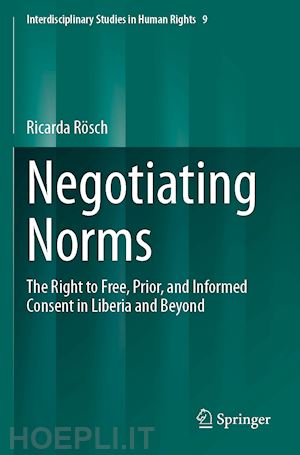

Questo prodotto usufruisce delle SPEDIZIONI GRATIS
selezionando l'opzione Corriere Veloce in fase di ordine.
Pagabile anche con Carta della cultura giovani e del merito, 18App Bonus Cultura e Carta del Docente
The book explores the right to free, prior and informed consent (FPIC) – a highly controversial right. It is mainly discussed in the context of large-scale business projects on Indigenous territories but also with respect to the creation of protected areas and communities’ traditional resource rights.
From a legal anthropological perspective, it attempts to disentangle the various coexisting understandings of FPIC and provide an explanation for the multiplicity of FPIC norms or – to put it in other words – its fragmentation.It examines the right- or stakeholders of FPIC, the scope of the consent requirement, the respect for self-determined decision-making, and the right to FPIC of women in different sociolegal fields. Moreover, it explores the impact of power relations, strategic alliances, and discourses within these fields and shows that the emerging FPIC norms are the result of norm negotiation processes.
The fields that are examined include transnational law – more specifically, human rights, environmental, and development law -, the Liberian post-conflict forest and land legislation, and Liberian community forests as fields in which FPIC is operationalized. Liberia is quite unique in this respect. It is not only one of the few countries in Africa recognizing FPIC but has also begun implementing it. The book shows that based on the logic of a sociolegal field, legal identities are discursively created and determine the meaning of FPIC. Moreover, different actors can resort to different legalities shaping the emerging FPIC norm.
Ricarda Rösch is a senior policy advisor at the Federal Ministry for Economic Cooperation and Development. From 2009 to 2014, she studied European, Comparative, and International Law in Bremen, Montpellier, and London. Subsequently, she joined the DFG-funded project "Human Rights as Standards for Transnational Economic Law" at the Friedrich-Alexander-University Erlangen-Nürnberg. With funding from the Heinrich-Böll-Stiftung, she completed her Ph.D. in 2022. Moreover, she worked as a visiting researcher at the Kofi Annan Institute for Conflict Transformation, as a consultant in the land sector (both in Liberia), and as a sustainability analyst for a sustainable bank.











Il sito utilizza cookie ed altri strumenti di tracciamento che raccolgono informazioni dal dispositivo dell’utente. Oltre ai cookie tecnici ed analitici aggregati, strettamente necessari per il funzionamento di questo sito web, previo consenso dell’utente possono essere installati cookie di profilazione e marketing e cookie dei social media. Cliccando su “Accetto tutti i cookie” saranno attivate tutte le categorie di cookie. Per accettare solo deterninate categorie di cookie, cliccare invece su “Impostazioni cookie”. Chiudendo il banner o continuando a navigare saranno installati solo cookie tecnici. Per maggiori dettagli, consultare la Cookie Policy.